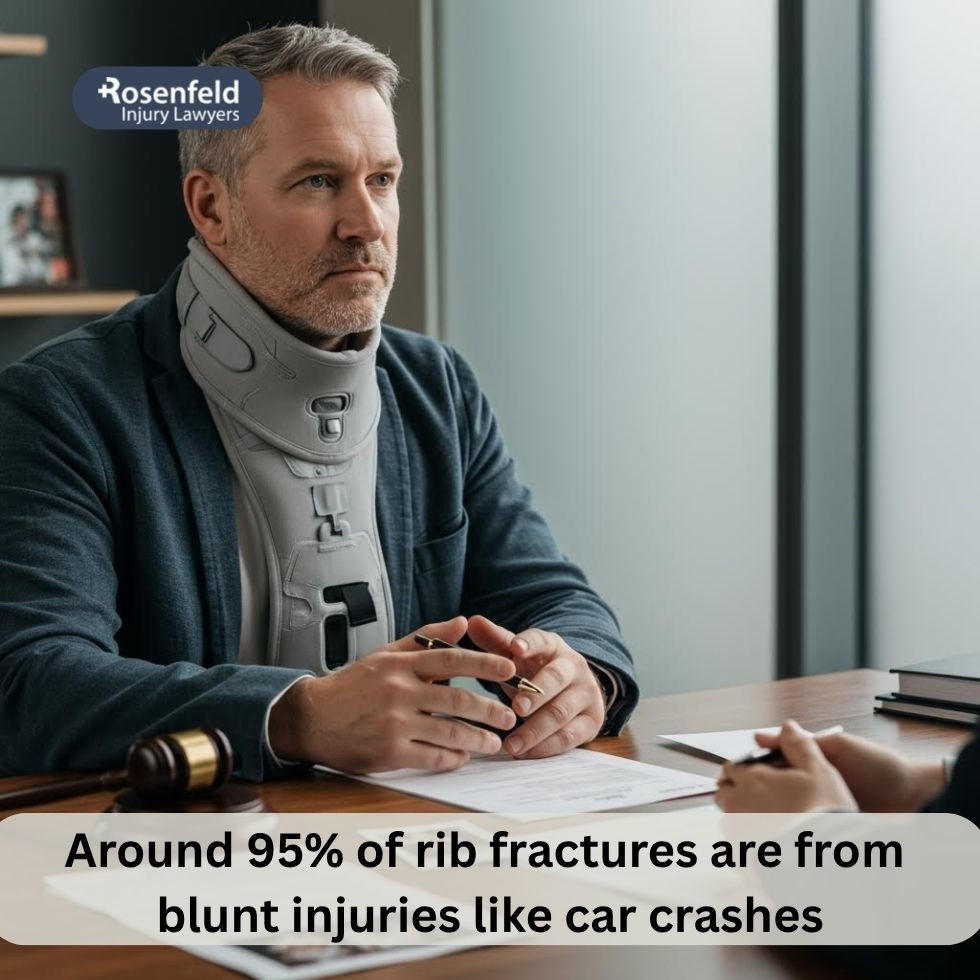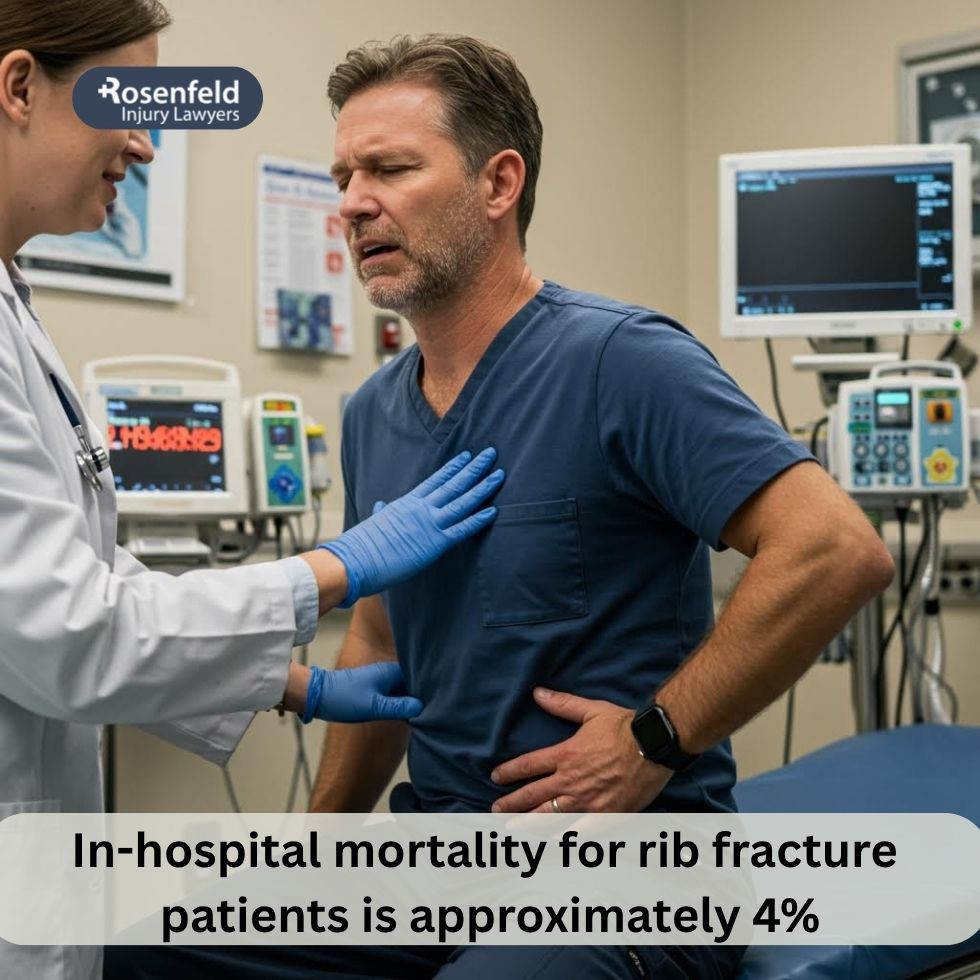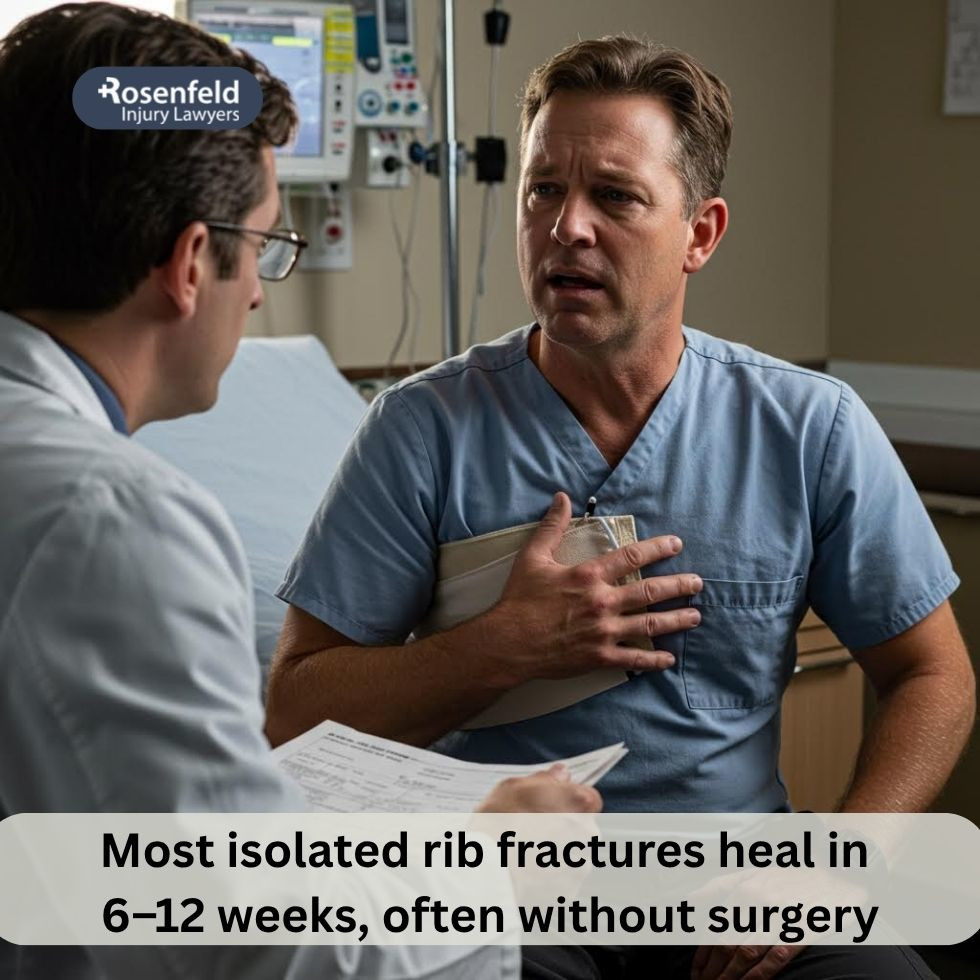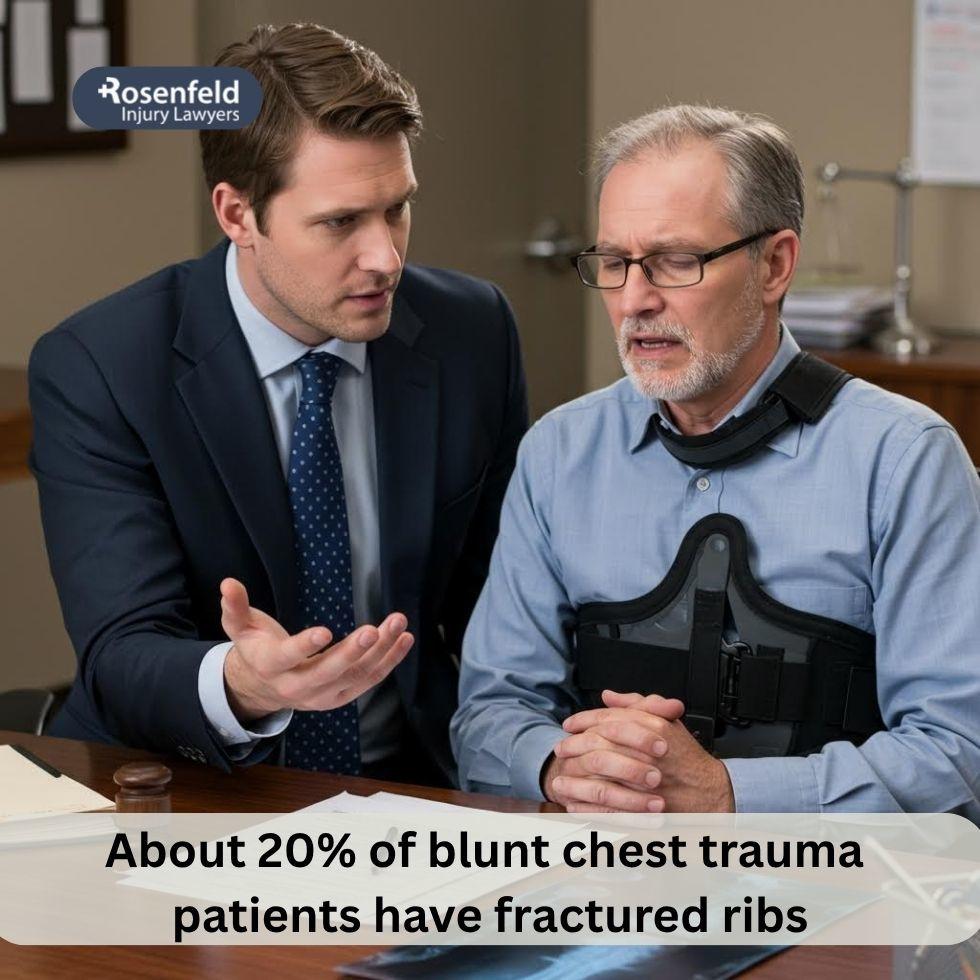- 24/7 Free Consultation: (888) 424-5757 Tap Here To Call Us
How to Deal With Broken Ribs From a Car Accident
Suffering from broken ribs from a car accident can be extremely painful and disruptive to your daily life. The force of impact in car accidents can lead to rib fractures, which can make breathing, moving, and even sleeping difficult.
If you have suffered broken ribs in a crash, understanding the symptoms, the recovery process, and your legal options is crucial.
How Broken and Cracked Ribs Happen in Car Wrecks
Rib fractures are among the most common chest injuries sustained in car accidents, with a rate of 52%. The rib cage is designed to protect vital organs, but during a collision, it can become a source of significant harm.
These injuries typically result from high-impact trauma to the ribs and can vary in severity depending on the force and angle of impact. Some of the most common causes include:
- Seatbelt pressure: While seatbelts play a critical role in preventing fatal injuries, they can also compress the rib cage during a crash. The force can leave the injury site bruised or cause clean breaks in the ribs.
- Airbag deployment: Airbags are designed to cushion the impact, but in high-speed crashes, the force of deployment can cause rib fractures, especially in smaller or older passengers whose bones may be more vulnerable.
- Blunt force trauma: Hitting the steering wheel, dashboard, or door frame can fracture ribs instantly. The sharp edges of broken ribs may further complicate recovery by irritating nearby nerves and tissue.
- Side impacts and rollovers: When a person is tossed against the interior of a vehicle, the force may concentrate on the chest. Depending on the position and angle of the blow, this can damage the rib area, lead to multiple rib fractures, and potentially harm internal organs.
Identifying damage to the ribs early can prevent serious complications, especially when symptoms like pain or trouble breathing begin to appear.

Delayed Rib Pain After a Car Accident: Symptoms to Watch For
Many victims don’t feel immediate pain after a car accident, only to experience delayed rib pain hours or even days later. This type of pain can be easy to overlook, but it often signals a more serious underlying injury involving the chest wall or surrounding tissues.
Symptoms of concern include:
- Fractured rib pain that intensifies with movement or when applying pressure to the chest wall.
- Bruised ribs that result in tenderness, swelling, and a deep, squeezing pain in the rib area.
- Shortness of breath or difficulty taking full breaths which can signal a severe rib fracture or internal damage.
- Chest tightness that builds throughout the day or after physical activity.
- Sharp pain when coughing, sneezing, or laughing, which may be related to a crack or break.
- Persistent or worsening chest pain, which could be a warning sign of a punctured lung or other internal injuries.
If you develop any of these symptoms, seek immediate medical care. Delaying evaluation after a crash may worsen complications or lead to misdiagnoses.
Fractured Ribs vs. Bruised Ribs: What’s the Difference?
Not every rib injury after a car accident leads to a fracture. Some people suffer bruises to the ribcage, while others experience more serious breaks, like a flail chest, where three or more consecutive ribs are fractured in two or more places. Knowing the difference is key to receiving the proper care and avoiding complications like chest infections or delayed healing.
Fractured Ribs
These occur when the rib bone is cracked or completely broken. Most rib fractures cause excruciating pain, especially during movement, coughing, or sneezing. They may also damage surrounding soft tissue or nearby blood vessels, heightening the risk of internal bleeding.
In complex cases, surgical intervention may be required to realign bones and promote recovery. Fractures can also limit mobility and cause trouble breathing, raising the chance of infection or poor blood supply to the area.
Bruised Ribs
With bruised ribs, the bones remain intact, but the surrounding soft tissue and muscles around the ribcage are impacted. These injuries still result in significant discomfort and may cause tenderness, swelling, and trouble taking deep breaths.
Although generally less serious than broken ribs, this injury can be mistaken for broken ribs due to similar symptoms. They’re often treated with rest, monitoring, and pain management, especially when dealing with other injuries from the car accident.

Internal Organ Damage from Broken Ribs
When a rib fracture is especially violent, the consequences extend beyond the bone itself. The rib cage protects vital organs, and when that structure is compromised, severe internal injuries can follow.
These complications often require surgical intervention and can be life-threatening without immediate care. These include:
- Punctured lungs (pneumothorax): A displaced rib can pierce the lung, allowing air to escape into the chest cavity and potentially causing the lung to collapse. This not only impairs breathing but can also lead to infection or shock.
- Severed aorta: Though rare, a sharp rib fragment may tear major blood vessels such as the aorta. This kind of internal bleeding is a medical emergency, requiring rapid surgical response to prevent fatal outcomes.
- Lacerated liver or spleen: The rib cage borders several organs. When ribs break and shift, their jagged edges can puncture the liver or spleen, leading to significant blood loss and the need for surgical intervention to control internal damage.
Early medical imaging and evaluation are crucial after high-impact chest trauma to identify these risks early and prevent long-term complications.
Difficulty Breathing After a Car Accident: A Warning Sign of Rib Injuries
One of the most alarming symptoms of broken ribs is difficulty breathing, and it’s not always immediately obvious how serious the problem is.
After a car crash, even a fractured middle rib can make it hard for your chest to expand fully, which interferes with normal airflow. This restriction can result from swelling, damage to the chest wall, or the fractured rib itself pressing against nearby tissue.
In more serious cases, sharp fragments from a cracked rib may puncture or irritate the lungs, leading to chest tightness, pain, or shortness of breath that worsens over time. Many people instinctively take shallow breaths to avoid pain, but this can limit oxygen intake and raise the risk of lung infections, such as pneumonia.
If you’re experiencing shortness of breath after a crash or feel like you can’t take a full breath without pain, it may be a sign of a chest injury requiring urgent care. Seek medical attention immediately. Delayed treatment can lead to long-term complications or life-threatening conditions.
How Long Do Broken Ribs Take to Heal?
The recovery period for injuries varies based on the type and extent of the damage. While bruising may heal within a few weeks, more complex rib fractures take longer and typically need additional care.
- Mild cases: A tender or bruised spot from bruising often heals in 3 to 6 weeks and needs rest and basic pain control.
- Moderate fractures: Healing a fractured rib usually takes 6 to 12 weeks. During this period, patients may still experience lingering rib or chest pain.
- Severe cases: More serious chest injuries, such as multiple fractures or a flail chest, can take 3 to 6 months or longer, particularly in trauma patients with multiple injuries.
Throughout the recovery process, it’s important to breathe deeply and follow prescribed physical therapy to prevent complications like pneumonia. In any case, immediate medical attention is vital to rule out internal damage and guide your recovery.
Healing rib bones also requires avoiding high-impact activity, practicing good posture, and monitoring for worsening symptoms.

Chicago Hospitals & Trauma Centers for Fractured Ribs
If you’ve suffered broken ribs, you’ll need treatment at a hospital equipped with a trauma center. Some of Chicago’s top options for broken ribs include:
- Northwestern Memorial Hospital (Level 1 Trauma Center)
- University of Chicago Medical Center
- Rush University Medical Center
- Stroger Hospital of Cook County
These facilities have specialists experienced in treating complex rib fractures and related internal damage.
Complications from Broken Ribs
Without proper care, broken ribs from a car accident can lead to serious and lasting health issues. Prompt medical attention is essential to avoid complications that may delay recovery and affect long-term health.
These complications include:
- Flail chest: When three or more adjacent ribs are broken in multiple places, a section of the ribcage becomes unstable. A flail chest makes it difficult to breathe deeply and often requires emergency care and a longer recovery period. In some cases, damage to nearby blood vessels and poor blood supply to the lungs or muscles can make healing more complex.
- Chest infection: Limited mobility from pain may cause shallow breathing, which prevents the lungs from fully expanding. This increases the chance of developing pneumonia, particularly in older adults or trauma patients. A lingering infection can slow recovery and result in further hospitalization.
- Other infections: Beyond respiratory illness, improperly treated rib fractures can cause infections near, particularly if surgical stabilization is required.
- Chronic pain: If broken ribs heal improperly or shift during recovery, it may lead to long-term discomfort. Ongoing rib pain and inflammation can interfere with sleep and daily activities, reducing quality of life even after the ribs appear to mend.
Always consult a healthcare provider for an accurate diagnosis and follow-up care. A health insurance company may require documentation of these complications to approve coverage.
Understanding the risks associated with broken ribs—and taking proactive steps—can improve outcomes and reduce the chance of developing pneumonia or a serious chest infection. Healing takes time, and how broken ribs heal depends heavily on the support and attention provided throughout the recovery process.

Seeking Compensation for Broken Ribs
If another driver’s negligence caused your car accident, you may be eligible for compensation that covers immediate medical attention, ongoing care, and lost wages.
This is especially important in cases involving multiple fractures, where breathing and mobility are affected. You can also seek damages for the pain and difficulty of taking deep breaths or performing daily tasks.
A trusted healthcare provider can help document your injuries, but the insurance company may still challenge your claim. An experienced car accident attorney in Chicago can negotiate on your behalf and protect your right to fair compensation.
Common Locations Where Broken Rib Car Wrecks Occur
Certain Chicago roads and intersections consistently report high accident rates, often resulting in serious outcomes like rib fractures, chest injuries, and other complications. Areas such as Lake Shore Drive are known for high-speed crashes, especially in poor weather conditions or when reckless driving is involved.
The Dan Ryan Expressway (I-90/I-94) experiences daily congestion, increasing the risk of rear-end collisions that can cause internal trauma or rib fractures.
Intersections like Western and North Avenue see frequent T-bone crashes, which can lead to blunt-force trauma to the rib cage, while Cicero Avenue and 79th Street are often cited for aggressive driving and high-speed impacts.
If you suffered injuries at one of these high-risk locations, working with a personal injury lawyer can help uncover who was at fault and assist you in pursuing fair compensation.
Free Consultation with a Chicago Car Accident Lawyer

If you’ve suffered broken ribs in a Chicago car accident, don’t take on the legal process alone, especially when the insurance company may undervalue your claim.
Our expert car injury attorneys help clients pursue damages for medical expenses, lost wages, and pain and suffering. If you’re managing chest pain while a fractured rib heals, we can help guide you in your next steps. Contact us today for a free consultation.
Call our office at (888) 424-5757 or use our online form.
All content undergoes thorough legal review by experienced attorneys, including Jonathan Rosenfeld. With 25 years of experience in personal injury law and over 100 years of combined legal expertise within our team, we ensure that every article is legally accurate, compliant, and reflects current legal standards.







